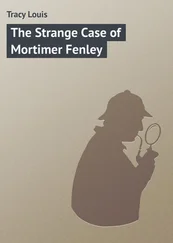Louis Tracy - The Silent Barrier
Здесь есть возможность читать онлайн «Louis Tracy - The Silent Barrier» — ознакомительный отрывок электронной книги совершенно бесплатно, а после прочтения отрывка купить полную версию. В некоторых случаях можно слушать аудио, скачать через торрент в формате fb2 и присутствует краткое содержание. Жанр: Прочие приключения, foreign_prose, на английском языке. Описание произведения, (предисловие) а так же отзывы посетителей доступны на портале библиотеки ЛибКат.
- Название:The Silent Barrier
- Автор:
- Жанр:
- Год:неизвестен
- ISBN:нет данных
- Рейтинг книги:5 / 5. Голосов: 1
-
Избранное:Добавить в избранное
- Отзывы:
-
Ваша оценка:
- 100
- 1
- 2
- 3
- 4
- 5
The Silent Barrier: краткое содержание, описание и аннотация
Предлагаем к чтению аннотацию, описание, краткое содержание или предисловие (зависит от того, что написал сам автор книги «The Silent Barrier»). Если вы не нашли необходимую информацию о книге — напишите в комментариях, мы постараемся отыскать её.
The Silent Barrier — читать онлайн ознакомительный отрывок
Ниже представлен текст книги, разбитый по страницам. Система сохранения места последней прочитанной страницы, позволяет с удобством читать онлайн бесплатно книгу «The Silent Barrier», без необходимости каждый раз заново искать на чём Вы остановились. Поставьте закладку, и сможете в любой момент перейти на страницу, на которой закончили чтение.
Интервал:
Закладка:
And then the train climbed a long spiral which gave a series of delightful views of a picturesque Swiss village, – exactly such a cluster of low roofed houses as she had admired many a time in photographs of Alpine scenery. An exclamation from a little boy who clapped his hands in ecstasy caused her to look through a cleft in the nearer hills. With a thrill of wonder she discovered there, remote and solitary, all garbed in shining white, a majestic snow capped mountain. Ah! this was the real Switzerland! Her heart throbbed, and her breath came in fluttering gasps of excitement. How mean and trivial were class distinctions in sight of nature’s nobility! She was uplifted, inspirited, filled with a sedate happiness. She wanted to voice her gladness as the child had done. A high pitched female voice said:
“Of course I had to call, because Jack meets her husband in the city; but it is an awful bore knowing such people.”
Then the train plunged into a noisome tunnel, and turned a complete circle in the heart of the rock, and when it panted into daylight again the tall square tower of the village church had sunk more deeply into the valley. Far beneath, two bright steel ribbons – swallowed by a cavernous mouth that belched clouds of dense smoke – showed the strangeness of the route that led to the silent peaks. At times the rails crossed or ran by the side of a white, tree lined track that mounted ever upward. Though she could not recall the name of the pass, Helen was aware that this was one of the fine mountain roads for which Switzerland is famous. Pedestrians, singly or in small parties, were trudging along sturdily. They seemed to be mostly German tourists, jolly, well fed folk, nearly as many women as men, each one carrying a rucksack and alpenstock, and evidently determined to cover a set number of kilometers before night.
“That is the way in which I should like to see the Alps,” thought Helen. “I am sure they sing as they walk, and they miss nothing of the grandeur and exquisite coloring of the hills. A train is very comfortable; but it certainly brings to these quiet valleys a great many people who would otherwise never come near them.”
The force of this trite reflection was borne in on her by a loud wrangle between the bridge players. A woman had revoked, and was quite wroth with the man who detected her mistake.
At the next stopping place Helen bought some chocolates, and made a friend of the boy, a tiny Parisian. The two found amusement in searching for patches of snow on the northerly sides of the nearest hills. Once they caught a glimpse of a whole snowy range, and they shrieked so enthusiastically that the woman whose husband was also in the city glanced at them with disapproval, as they interrupted a full and particular if not true account of the quarrel between the Firs and the Limes.
At last the panting engine gathered speed and rushed along a wide valley into Samaden, Celerina, and St. Moritz. Mrs. Vavasour seemed to be absorbed in a Tauchnitz novel till the last moment, and the next sight of her vouchsafed to Helen was her departure from the terminus in solitary state in a pair-horse victoria. It savored somewhat of unkindness that she had not offered to share the roomy vehicle with one who had befriended her.
“Perhaps she was afraid I might not pay my share of the hire,” said Helen to herself rather indignantly. But a civil hotel porter helped her to clear the customs shed rapidly, secured a comfortable carriage, advised her confidentially as to the amount that should be paid, and promised to telephone to the hotel for a suitable room. She was surprised to find how many of her fellow passengers were bound for Maloja. Some she had encountered at various stages of the journey all the way from London, while many, like Mrs. Vavasour, had joined the train in Switzerland. She remembered too, with a quiet humor that had in it a spice of sarcasm, that her elderly acquaintance had not come from England, and had no more right to demand special accommodation at Coire than the dozens of other travelers who put in an appearance at each station after Basle.
She noticed that as soon as the luggage was handed to the driver to be strapped behind each vehicle, the newcomers nearly all went to a neighboring hotel for luncheon. Being a healthy young person, and endowed with a sound digestion, Helen deemed this example too good not to be followed. Then she began a two hours’ drive through a valley that almost shook her allegiance to Scotland. The driver, a fine looking old man, with massive features and curling gray hair that reminded her of Michelangelo’s head of Moses, knowing the nationality of his fare, resolutely refused to speak any other language than English. He would jerk round, flourish his whip, and cry:
“Dissa pless St. Moritz Bad; datta pless St. Moritz Dorp.”
Soon he announced the “Engelish kirch,” thereby meaning the round arched English church overlooking the lake; or it might be, with a loftier sweep of the whip, “Piz Julier montin, mit lek Silvaplaner See.”
All this Helen could have told him with equal accuracy and even greater detail. Had she not almost learned by heart each line of Baedeker on the Upper Engadine? Could she not have reproduced from memory a fairly complete map of the valley, with its villages, mountains, and lakes clearly marked? But she would not on any account repress the man’s enthusiasm, and her eager acceptance of his quaint information induced fresh efforts, with more whip waving.
“Piz Corvatsch! Him ver’ big fellow. Twelf t’ousen foots. W’en me guide him bruk ze leg.”
She had seen that he was very lame as he hobbled about the carriage tying up her boxes. So here was a real guide. That explained his romantic aspect, his love of the high places. And he had been maimed for life by that magnificent mountain whose scarred slopes were now vividly before her eyes. The bright sunshine lit lakes and hills with its glory. A marvelous atmosphere made all things visible with microscopic fidelity. From Campfer to Silvaplana looked to be a ten minutes’ drive, and from Silvaplana to Sils-Maria another quarter of an hour. Helen had to consult her watch and force herself to admit that the horses were trotting fully seven miles an hour before she realized that distances could be so deceptive. The summit of the lordly Corvatsch seemed to be absurdly near. She judged it within the scope of an easy walk between breakfast and afternoon tea from the hotel on a tree covered peninsula that stretched far out into Lake Sils-Maria, and she wondered why anyone should fall and break his leg during such a simple climb. Just to make sure, she glanced at the guidebook, and it gave her a shock when she saw the words, “Guides necessary,” – “Descent to Sils practicable only for experts,” – “Spend night at Roseg Inn,” – the route followed being that from Pontresina.
Then she recollected that the lovely valley she was traversing from beginning to end was itself six thousand feet above sea level, – that the observatory on rugged old Ben Nevis, which she had visited when in Scotland, was, metaphorically speaking, two thousand feet beneath the smooth road along which she was being driven, and that the highest peak on Corvatsch was still six thousand feet above her head. All at once, Helen felt subdued. The fancy seized her that the carriage was rumbling over the roof of the world. In a word, she was yielding to the exhilaration of high altitudes, and her brain was ready to spin wild fantasies.
At Sils-Maria she was brought suddenly to earth again. It must not be forgotten that her driver was a St. Moritz man, and therefore at constant feud with the men from the Kursaal, who brought empty carriages to St. Moritz, and went back laden with the spoil that would otherwise have fallen to the share of the local livery stables. Hence, he made it a point of honor to pass every Maloja owned vehicle on the road. Six times he succeeded, but, on the seventh, reversing the moral of Bruce’s spider, he smashed the near hind wheel by attempting to slip between a landau and a stone post. Helen was almost thrown into the lake, and, for the life of her, she could not repress a scream. But the danger passed as rapidly as it had risen, and all that happened was that the carriage settled down lamely by the side of the road, with its weight resting on one of her boxes.
Читать дальшеИнтервал:
Закладка:
Похожие книги на «The Silent Barrier»
Представляем Вашему вниманию похожие книги на «The Silent Barrier» списком для выбора. Мы отобрали схожую по названию и смыслу литературу в надежде предоставить читателям больше вариантов отыскать новые, интересные, ещё непрочитанные произведения.
Обсуждение, отзывы о книге «The Silent Barrier» и просто собственные мнения читателей. Оставьте ваши комментарии, напишите, что Вы думаете о произведении, его смысле или главных героях. Укажите что конкретно понравилось, а что нет, и почему Вы так считаете.












